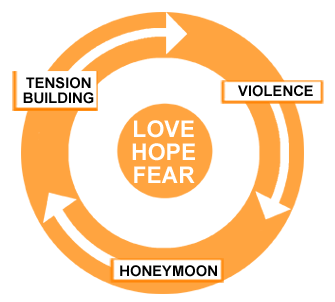Many people who are in abusive relationships say that the violence follows a pattern. It does not happen randomly; rather, it often occurs in a repeating cycle that is made up of three phases.
Phase 1: Tension-Building
The abuser is argumentative, angry, uses yelling, criticism, swearing, and angry gestures. Sometimes the abuser will use coercion, threats or minor fights may occur. The tension between the couple gets worse and worse, and the person being abused often feels like something bad is going to happen. Victims of abuse during this phase sometimes say they feel like they are walking on eggshells.
Phase 2: Use of Violence – The “Explosion”
As the tension builds, violence is highly likely – the explosion phase. This is when a major act of violence occurs, including physical and/or sexual attack and threats to harm, as well as verbal abuse. It is in this phase that injury is most likely to occur or that the police might come.
Phase 3: “Honeymoon” Period
After the explosion, the abuser feels sorry for the explosion, and acts apologetic and loving. The abuser might say things like:
- I’ll never do it again
- I’m sorry and I never meant to hurt you
- I promise I will change
- I promise I’ll get help
- I only did it because I was drunk/high/lost my temper, etc.
They may shower gifts on the other person or act like the person you first fell in love with, and things get better…for a little while. But the honeymoon doesn’t last – the tension starts all over again and the cycle continues.
These three phases tend to be repeated over time and may have days, weeks or months between each. Sometimes the period between phases gets shorter and shorter. This explains how the three dynamics of love, hope and fear, keep the cycle in motion and make it hard to end a violent relationship. Often, the longer the relationship lasts, the faster the cycle will turn – and the worse the abuse gets during the explosion.
This cycle might look exactly like what’s happening in your relationship, or it might not at all. Either way, the violence is not your fault. You are not responsible for someone else’s behavior and you do not deserve the abuse.
I have found that anger problems can be due to different factors, with those unique to you having to be identified clearly. Your anger may be due to trauma or abuse, safer to get mad that feel the underlying sadness and powerlessness, self-protection for more hurt or rejection, or something more that has to be kept out of awareness. While managing your anger can be a relatively short-term problem or a battle you have had for many years, it is correctable! We work together to address both the underlying sources of your anger along with developing more-effective strategies and actions that can often result in you noticing some improvement in a short time. Anger management online course can help.
[button link=”https://nuhopecare.com/court-ordered-programs/free-anger-classes/” type=”big” color=”teal”] Free Anger Quiz!![/button]
